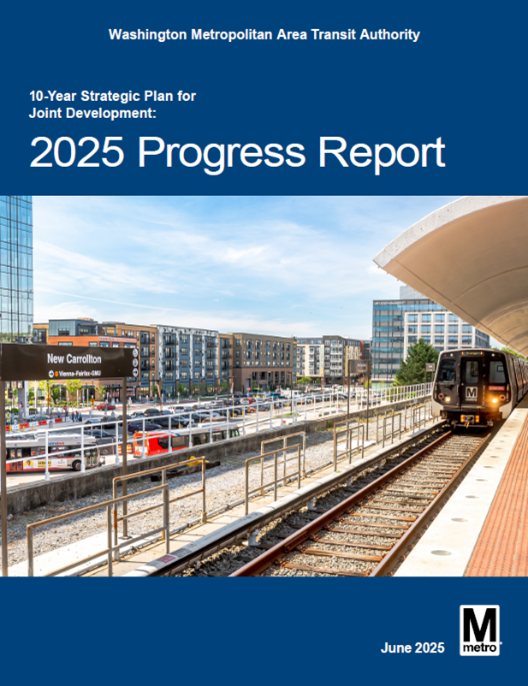Real Estate Development

10-Year Strategic Plan | Solicitations | Project Cycle | Guidelines | Compact Public Hearing Resources
Metro collaborates with developers to build housing, office, retail, and other amenities on Metro property, typically via ground lease, through a program known as Joint Development. The development projects are a form of Transit-Oriented Development (TOD) and support local economic development and Metro ridership (see Metro's TOD page for additional information on key benefits and tools). All joint development activities are managed in accordance with Metro Board-approved guidelines (see section below) and must meet the following criteria:
- Maintains or enhances transit ridership, safety and/or access
- Maintains or enhances WMATA's ability to operate transit services and/or maintain the transit system
- Has a positive net fiscal impact for WMATA
- Is consistent with or enhances local land use and economic development plans
- Complies with the FTA Guidelines
10-Year Strategic Plan

In April 2022, Metro published a 10-Year Strategic Plan for Joint Development, which calculated the fiscal and economic impact of Metro joint development projects, identified strategies to accelerate joint development, prioritized stations for future joint development, and set a goal of 20 new joint development agreements by 2032.
In June 2025, Metro released a progress report and other resources to highlight key accomplishments since 2022, update fiscal impact figures, illustrate how new strategies have helped overcome challenges, and update development priorities. The report is complemented by a Work Plan and a new GIS-based development tracker.
Solicitations
Project Cycle
The joint development project cycle begins by evaluating a site's needs, development potential, value, feasibility, as well as financial, technical, and other challenges. A key step in the process is confirming potential adjustments to transit facilities, which are subject to Metro Board approval following a Compact Public Hearing.
Metro engages the private sector in joint development through a public solicitation process. A Joint Development Solicitation details the opportunity, site information and infrastructure requirements for prospective development partners (current opportunities are listed on the left side of this page). Upon selection of a development partner, Metro and the developer negotiate and execute a Joint Development Agreement (JDA) that is approved by the Metro Board and FTA. The development partner leads entitlement, financing, and construction of the project in accordance with the requirements of the JDA.
Guidelines
- Joint Development Policies (April 2018)
- Joint Development Program Guidelines (December 2022): Process and criteria by which joint development projects are offered, evaluated, and approved
- Station Area Planning Guidelines (October 2017): Provides instruction for determining the layout, configuration, and capacity of transit facilities and multi-modal access at Metrorail stations
- FTA Joint Development Circular 1C 7050.C (January 2024): Guidance on how FTA-funded real property can be used for joint development
Compact Public Hearing Resources
- Brookland Staff Report and Environmental Evaluation
- Capitol Heights Staff Report and Environmental Evaluation
- Congress Heights Staff Report and Environmental Evaluation
- Deanwood Staff Report and Environmental Evaluation
- New Carrollton Staff Report and Environmental Evaluation
- Takoma Staff Report and Environmental Evaluation
- West Falls Church Staff Report and Environmental Evaluation